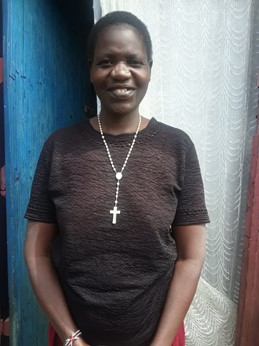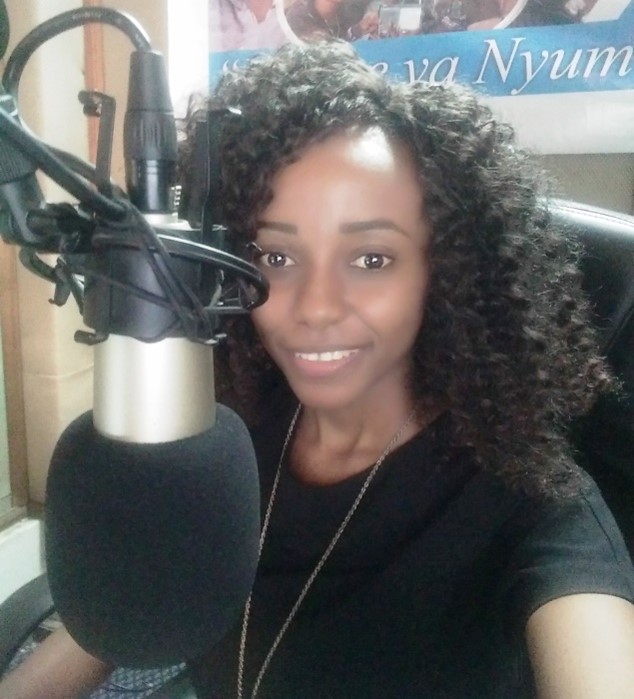Cultural shift with menstrual education on Nakuru airwaves
For the longest time, Immaculate Namalwa Makobi struggled with her menstrual periods. The forty-nine year old resident of Njoro town in Nakuru County, like many Kenyan women from deprived backgrounds, did not have find it easy way to manage her menstrual periods.

Unique for Immaculate was that sanitary pads left her extremely itchy in her genitals. So she settled on soft old rugs wrapped up in fluffy blanket material. Her menses recently stopped – she believes it is menopause. However, she believes her frustrating menstruation experience prepared her to help her daughter, whose menses are painful. For her, the recent Menstrual Health Management (MHM) programme on her favourite community station Radio Amani are godsent.
“Before we started listening to the MHM programme , my daughter coped with her painful menses by sleeping,” she says. “One of the most useful tips from the broadcasts is for a person with painful periods to be active in their daily life. Additionally, my daughter took the advice to fill something like a polythene bag with warm water and press it on her abdomen to ease the period pain. It’s relieving.”
Besides providing useful tips on menstrual hygiene management, the broadcastsprogramme, sponsored by UNICEF and through Centre for Behaviour Change Communications, emphasises that menstruation is normal and not something to be ashamed of. Further, the broadcastsit has a focus on educate educating men and boys on the meaning of menstruation, and urge them to support their sisters, daughters and wives. “Since then we hear testimonies from fellow women of the changes in their husbands, brothers and sons-in-law. We laugh about it. Previously, men the males used to describe women’s monthly periods as ‘chafu’ (dirty).”
Immaculate’s sentiments are confirmed by Madelena Mkirema, a presenter at Nakuru’s Radio Amani. “Through this programme, we’re creating awareness. The aim is to stop stigma for both genders,” says Madelena. “We’re targeting the male gender and critics of umama. Umama is a slang used to derisively refer to men who have sympathy for female things. If you’re told you have umama, it means, “You’re a man. Why are you speaking on women issues?”
Society, according to Madelena, demarcates between what concerns women and what concerns men. This demarcation is especially emphatic when it comes to biological processes like menstruation. The MHM programme has, however, bridged this divide and is shifting long-held perspectives. “Since the broadcastsshow started, many male callers in our shows now acknowledge that there’s nothing wrong with discussing menstrual health,” Madelena says. “Male single parents have also called to express their gratitude o the show for empowerings them to help their daughters. Married men say that when their wife is away, they are now sufficiently informed to not abandon their daughters to their own fate.”
A few areas, such as the presence of a transgender persons, such as one who called on air, are not covered. “He said that he felt cut out by the broadcasts,” Madelena explains. The other notable occurrence is that most on-air callers are parents talking on behalf of their daughters. Madelena has so far not understood why the girls are themselves not calling.
One dimension common myth of menstruation is that which could not be confirmed in Nakuru is the rumour that menstruation leads to many underage pregnancies. This has no direct correlation, Our attempts to get a girl to confirm this did not bear fruit although authorities in other regions of Kenya have spoken of men purchasing sanitary pads for girls in exchange for sex, leading to pregnancies.

Radio Amani play the radio spots and dramas that they receive as part of the programme content as many times as possible every day but mostly during prime time, around news. “We play these audio resources at least 3 times daily and engage our audience in a discussion at least twice in a week.”
This reporting is with support of UNICEF Kenya under the Menstrual Health Management Campaign being run by Centre for Behaviour Change and Communication (CBCC). The campaign purpose is to raise awareness about menstrual hygiene, break the silence, debunk myths and misconceptions around menstruation and provide support to adolescent girls and young women to practice proper menstrual hygiene management.
Our Services
View our Centre for Behaviour Change and Communication Services.













